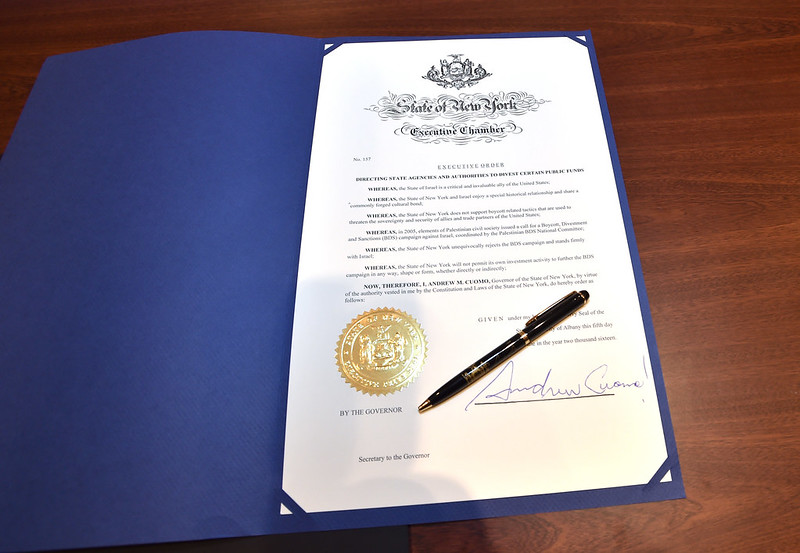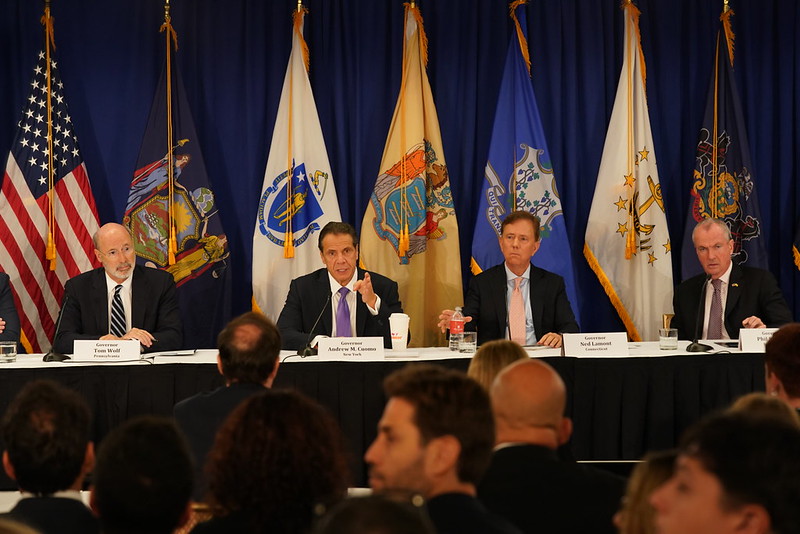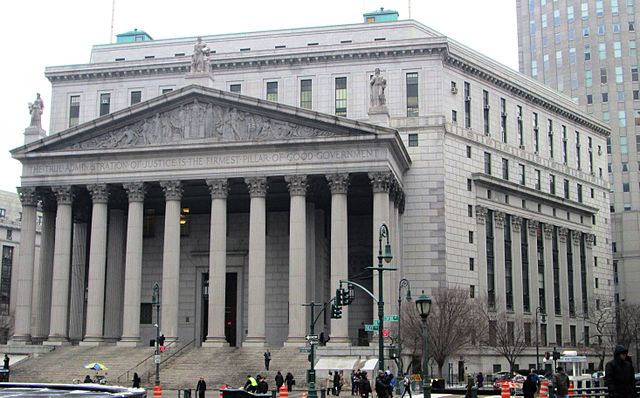As Thousands of New Yorkers Face Illness and Death, the Governor Must Suspend Two-Witness Rule for Wills and Other Key Documents

A Cuomo executive order (photo: Kevin P. Coughlin/Governor's Office)
Death is all around us and forcing New Yorkers, regardless of age, ability, or immigration status to confront our vulnerability and mortality.
Among the “acts” in a recent “This American Life” episode, writer/daughter Jiayang Fan in a “A View from the Park,” spoke of her fear and trauma at no longer being able to visit her mother in a nursing home. Fan vividly expressed her feeling of desperation because her mother has ALS and while cognitively sharp, can only communicate with her eyes, as she is a prisoner in her own body. Her mother is among the most frail and vulnerable to contracting the new coronavirus (COVID-19) and if she does, it is likely she will die. Fan, in a recent New Yorker article, also explored dying, family, and culture through the lens of hospice in China.
In another “act” in that same episode, “The Inside Game,” a producer took us inside an apartment where two parents and their young daughter were literally fighting for their lives against the coronavirus. With death staring him in the face, the father spoke of the need to get his “affairs” in order.
Even in the best of times, we need to plan for incapacity and death. With the COVID-19 pandemic bearing down on New York, such planning becomes more urgent. Key planning documents include a will, health care proxy, power of attorney, and for parents of young children, a standby guardian designation.
New York law requires that two people act as witnesses to these documents, except a power of attorney can be signed before a notary public, but an optional “statutory gifts rider” needs two witnesses. (Under the recent Executive Order EO 202.7, the power of attorney could be signed and notarized remotely.)
Yet the process of legally executing these documents would violate Governor Cuomo’s “New York on PAUSE” executive order and place the participants at risk of harm from exposure to the coronavirus.
While it is true that a will is not the only way to plan for death—for example, we can name beneficiaries on retirement accounts, bank accounts, or life insurance; we can create trusts; and we can name a person as a joint owner of bank accounts and other assets—a will is often an essential part of estate planning.
For many people, making a will can avoid family conflict, distribute property as the testator wishes, name a guardian for minor children, and express wishes about funeral and burial arrangements.
All parents of minor children should name guardians “just in case,” but parents with chronic or fatal medical conditions, or who are undocumented and vulnerable to detention or deportation, have a particularly important duty to plan for the care of their children.
Under New York law, parents who are vulnerable due to a medical condition or immigration status have the option of designating a Standby Guardian, “just in case” the parent becomes unable to care for the children due to illness, death, detention, or deportation.
A health care proxy names an agent to make health care decisions. In some ways, the health care proxy is less important, because of the NY Family Health Care Decisions Act, which allows a spouse, child, other family member, or friend to make health care decisions in a hospital, nursing home, or hospice facility.
But a health care proxy is important because it allows us to choose an agent and give individualized directions about medical treatment under certain conditions. Also, and perhaps most troublesome, health care proxies often get signed in a health care facility, and this is not a burden that health care workers should bear along with everything else.
Allowing for electronic signatures and remote witnesses for these planning documents would not sacrifice their integrity and more importantly, would prevent more New Yorkers from being exposed to or transmitting COVID-19.
Governor Cuomo should make it possible for New Yorkers to execute planning documents in this emergency by signing a new executive order that does the following three things:
One: Suspends Section 307(1) of the State Technology Law to the extent necessary to allow an electronic signature to be used instead of a signature written by hand in executing a will, health care proxy, designation of standby guardian for minor children, and the statutory gifts rider to a power of attorney.
Two: Modifies Sections 3-2.1 and 3-2.2 of the Estates, Powers, & Trusts Law, Section 2981 of the Public Health Law, Section 1726 of the Surrogate’s Court Procedure Act, and Section 5-1514 of the General Obligations Law to allow for remote witnesses for a will, health care proxy, designation of standby guardian for minor children, and the statutory gifts rider to the power of attorney.
Three: Extends to workers of “essential businesses or entities” the right to make an oral or written will under New York Estates, Powers, Trusts Law § 3-2.2, which allows oral wills without witnesses and written wills signed by the testator for those serving in, or accompanying, the armed forces, or mariners at sea.
***
Joe Rosenberg is a Professor at CUNY School of Law. On Twitter @JoeRosenbergLaw.
***
Have an op-ed idea or submission for Gotham Gazette? Email This email address is being protected from spambots. You need JavaScript enabled to view it.
To Save Our Safety Net, Continue the Regional Coronavirus Approach

Gov. Cuomo with neighboring governors (photo: Governor's Office)
Tri-state governors have coordinated to close bars. Now they must coordinate to close tax loopholes.
Governor Cuomo has gotten a lot right in addressing the COVID-19 health crisis in the past few weeks. But at the state budget deadline, he has been far too willing to shred the social safety net that millions of New Yorkers rely on, and so many more will need as the economic crisis worsens.
One thing he got right could point the way to repair some of that damage.
Cuomo saw right away the need to get New York working closely with New Jersey and Connecticut. The governor quickly brought the tri-state region together to shut down bars and recreational businesses, and to collaborate on a regional approach to confront the coronavirus crisis.
That’s no small feat. Regional coordination has long been the elusive dream of good government gurus, seeking a saner approach to transportation and economic development. President Trump appears so threatened by this new tri-state alliance that he threatened to quarantine us off from the rest of the country.
Now that this tri-state partnership exists, we must use it for more. A regional approach can help us replace lost revenue and rise to the recovery challenges we face.
As New York State looked ahead to its new fiscal year, a $6 billion budget deficit was blown wide open by the pandemic, with tax revenue projected to drop by as much as $15 billion. Given the halt of so much economic activity and mass layoffs, Connecticut and New Jersey face similar problems. The federal relief package offers scant help. We must keep fighting for more, but it’s not likely to be anywhere near enough.
To address the budget gap, Governor Cuomo has pushed reductions to health care and public education funding (including steep cuts to already diminished CUNY and SUNY schools), and in aid to cities and counties. In the midst of the crisis, his Medicaid Redesign Team proposed a $2.5 billion cut to the projected state Medicaid budget, including $400 million that would have gone to hospitals just as they battle coronavirus.
Some cuts are necessary, but these cuts to our core safety net programs will be devastating to the very people hardest hit by the COVID-19 crisis. The coronavirus pandemic has turned pre-existing gaps into gulfs. Those who were already on the margins, served by underfunded hospitals, or living paycheck to paycheck, are hit hardest by the public health and economic catastrophe. Undercutting their health care and education is not the answer.
Revenues are going to take a big hit, though, as income and sales taxes plummet. So we need new ways to raise funds from those who have plenty, rather than cutting services for those who did not have enough even before this crisis.
As he has been in the past, Governor Cuomo has been reticent to increase taxes on the wealthiest New Yorkers, or even to close tax loopholes.
But his own regional response offers a new, smart way to do so. In the past, one concern he has voiced about such policies has been that businesses or wealthy individuals will flee New York State to avoid any new tax policy, thus depriving us of even more revenue. After all, it is not that hard to commute to work on Wall Street from Greenwich rather than from Scarsdale. Or to move your business address to Jersey City.
One change that advocates have long sought is to close the “carried interest” loophole. Because of this loophole, the income of private equity and hedge fund managers is taxed at half the rate of other taxpayers (their income is taxed at the “capital gains” rate, lower than the income tax rate, even though this is not investment money that the managers have put at any risk).
Two years ago, Cuomo proposed to close this loophole, calling it a “fairness fix” that could bring in over $1 billion to state coffers. But there was one hitch: it would only go into effect if neighboring states would adopt it as well. Sadly, they did not.
The regional compact that the governor has established to confront the COVID-19 crisis is a great opportunity to revive this effort. Just as our states have coordinated to close bars and restaurants, we can coordinate to close this loophole.
The governors should take a similar approach to coordinate on other proposals to tax the region’s very wealthiest, such as a tax on wealth over $1 billion, annual income over $5 million, or an increase in corporate tax rates. Yes, Wall Street has taken a hit. But the top 1% in our region are not facing food insecurity, eviction, and homelessness.
Given the likely need to reopen this budget as the contours of economic and fiscal challenges become clearer, and the pain of the cuts is felt, it is not too late to consider these tax policy changes. In fact, it is right on time.
Raising revenue to fill budget gaps and provide essential services is not the only place where new models of regional partnership are needed. Governor Cuomo railed at the federal relief effort passed last week, harping on the relatively smaller pot of direct aid for New York state and local governments. But that’s not the only place the federal response fell short.
Our region has flourished over the past decades as a result of the work and creativity of immigrants. But many of those very families (undocumented people, mixed-status families, and even many immigrants with legal status) will be denied federal relief. They will not be eligible for the $1,200 emergency checks heading out to the majority of Americans, or for the expanded disaster unemployment insurance. Without help, they will soon be facing very real crises, unable to pay for food or rent.
Our region’s economy is built on the labor and the spending of these workers and their families, who work in restaurants, clean buildings, deliver food, take care of the elderly and the young, and much much more. We cannot afford to leave them behind.
We need a regional approach both to make up the budget shortfall and to put money where it is urgently needed right now: in our hospitals, and in the pockets of the most vulnerable families.
We will all feel the squeeze of this crisis. But those who will suffer the most are those whose health insurance, education, and social services have been put on the chopping block. Using a regional approach to raise revenues from those who have more than enough is both the smart and compassionate path forward.
***
Brad Lander is a New York City Council Member from Brooklyn, and the Council’s Deputy Leader for Policy. He is a candidate for New York City Comptroller in 2021. On Twitter @bradlander.
***
Have an op-ed idea or submission for Gotham Gazette? Email This email address is being protected from spambots. You need JavaScript enabled to view it.
Amid Coronavirus Crisis and Beyond, Equal Justice for All, Including U.S. Senators

Equal justice for all, whether a top elected official or not, the author writes (photo: Wikimedia Commons)
Alongside the daily coronavirus news come allegations about shocking abuses of power. Several United States senators, most notably Senators Burr and Loeffler, allegedly used non-public information — confidential congressional briefings about COVID-19 — to sell stocks whose prices they believed would drop due to the pandemic. Even worse, while taking steps to profit from the coming pandemic, both assured constituents that there would be no public health or economic crisis. Instead of pushing the president to act sooner, they lulled segments of the public into complacency. This alleged conduct is morally abhorrent and possibly illegal.
But if history is any guide, any prosecution of these senators is likely to proceed far differently from the typical prosecutions of everyday Americans. The coronavirus has laid bare so many stark inequities in our society, like access to health care, economic ability to do social distancing, and even access to coronavirus testing. This crisis is also further revealing terrible truths about the inequities of our criminal justice system — inequities long in need of sweeping reform for the sake of justice, now also more urgently than ever for the sake of public health.
Consider the disparity between what these senators would face in the criminal justice system with what is faced by ordinary people, so many of whom are currently at risk for coronavirus infection because of their unnecessary incarceration.
Based upon my time as a federal prosecutor focused on public corruption, here is likely what will happen next to the senators, if they’re investigated. Federal prosecutors will analyze the stock trades, interview people who attended closed-door briefings with the senators, and subpoena the senators’ financial records. Defense lawyers will have the chance to meet with prosecutors before any charges are brought; they’ll be shown incriminating evidence and given the chance to argue that no charges should be brought. If charges are brought, Senators Burr and Loefller will be permitted to turn themselves in rather than be arrested, the judge will set an affordable bail amount, and they will subsequently enjoy ample process, a speedy trial, and, if found guilty, fair treatment post-conviction.
This process will bear little resemblance to what happens every day to ordinary defendants: quick arrests often followed by little to no investigation, exorbitant bail beyond the defendant’s reach, slow or last-minute disclosure of evidence the prosecutor will use at trial, elusive trial dates adjourned for years, and, if found guilty, abhorrent prison conditions and re-sentencings for technical parole violations.
This situation was dire before the coronavirus. Our country’s incarceration rates are historically high and well out of line with other countries. Our jail and prison population has ballooned by 500% over the last 40 years, and we are home to 5% of the world, but 25% of incarcerated persons. Research demonstrates that these high incarceration rates do not make us safer.
Now, it’s dire from both a criminal justice and public health perspective. People already in custody and those arrested during the pandemic will be at a heightened risk for contracting the coronavirus. Arresting people and taking them to the courthouse involve multiple interactions during which the coronavirus may spread. People in jails are in overcrowded spaces, unable to practice social distancing, and with little or no access to soap.
Advocates, elected officials, and some law enforcement leaders have pointed to immediate steps to shrink the jail and prison populations: halt arrests for low-level offenses; end cash bail (or, in New York’s case, maintain recent bail reforms); stop imprisoning people for technical parole violations; and release incarcerated people at high coronavirus risk because of age or health conditions, whether through clemency or other methods. These measures are critical from a justice perspective: in the current situation, failing to take these measures will be tantamount, for many, to a death sentence. But it’s also a matter of public health and reducing the spread of the virus.
The coronavirus has led to a swift unmasking of many unjust fault lines in our law and society. Just as coronavirus tests should be available to everyone, not just the connected or famous, a criminal justice system that’s compassionate, effective, and fair should be available to everyone, not just those who are wealthy, or who happen to be senators.
***
Alvin Bragg served as Chief Deputy New York State Attorney General and a federal prosecutor in Manhattan. He is a Visiting Professor, Co-Director of the Racial Justice Project at New York Law School, and candidate for Manhattan District Attorney. On Twitter @AlvinBraggNYC.
***
Have an op-ed idea or submission for Gotham Gazette? Email This email address is being protected from spambots. You need JavaScript enabled to view it.




